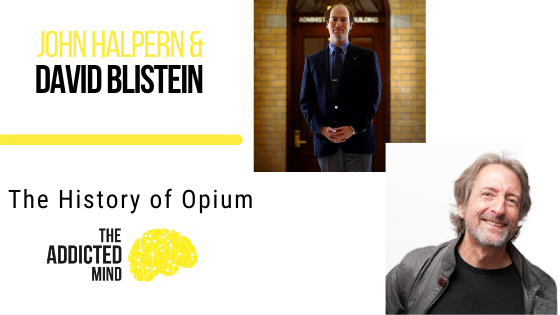Opium has been around but what many people don’t realize is how much it has shaped society and culture. The United States has spent over $1 trillion on drug enforcement since President Nixon declared a war on drugs. And by any measure, that crisis has become worse. Could we ever imagine a time where humanity is finally free of these substances?
On today’s episode, Duane talks with John Halpern and David Blistein, co-authors of the book, Opium: How an Ancient Flower Shaped and Poisoned Our World, where they talk about the history of opium and the reasons they wrote this book. It’s a call for compassion and care for people who are struggling with addiction.
Unfortunately, our current system is not providing proper treatment. Worse, we punish people for not accepting treatment or seeking it out in the United States. The person who gets blamed is the one who’s suffering. Whatever people need to do politically or as a society about these issues of drug abuse should not be legislated onto the backs of our patients’ suffering and pain. And yet, that’s still is happening.
The Substance Abuse Mental Health Services Administration admits that over 90% of people in the United States who would like to get serviced have no ability to get treatment.
There’s a confusing message we’re sending out to people that there’s no safe way to use it. We’re not talking about what these drugs do. We’re not accepting how they are medicines and that they have these horrible side effects, and extreme versions of those side effects when we see somebody addicted.
Instead, we punish them as if they had a full volitional choice when it’s causing changes to their brain over time. At the end of the day, we need to welcome people with substance abuse issues for being the human beings that they are and with the problems they have because we all have problems. And we need to treat them with respect and love and understanding and learn from them.
In this episode, you will hear:
- When the use of opium began
- What does the term chasing the dragon mean
- The potential of peptides to replace opiates
- The current justice system as it relates to drug courts
- How the interdiction of drugs corrupts the governments at all levels
- The lack of proper treatment
- How the opioid epidemic started with Purdue Pharma
- Possible strategies and solutions to solve this problem
- The confusing message we’re sending out to people that there’s no safe way to use it
Key Quotes:
[08:26] – “For 5000 years, virtually the only antidepressant we had was opium.”
[10:03] – “A drug is not a drug is not a drug, how people get addicted to a drug is different and understanding some of the impact they have on us also can be different.”
[10:44] – “Now, people think that if you ever do oxycodone for pain, the next thing you know, you’re going to be in a rehab center. And it’s not true, but it’s walking the line.”
[12:59] – “We are tethered much more tightly to the opium plant, a plant that does not even exist in the wild today more than ever.”
[14:10] – “The person who gets blamed is the one who’s suffering.”
[17:19] – “I consider drug court a human rights crime because we have prosecutors and judges pretending that they can practice medicine when they have no training in it.”
[18:55] – “As long as it’s interdicted, it’s worth a lot of money. It corrupts governments at all levels.”
[20:25] – “We turn around without providing proper treatment, and then we punish people for not accepting treatment or seeking it out in the United States.”
[28:15] – “There are more people dying each year now from opioid-related overdoses than those that died in the Vietnam War. That’s 70,000 people a year dying now.”
[35:23] – “Labeling heroin and other opiates as drugs of abuse doesn’t erase the fact that they are medicines in the United States.”
Subscribe and Review
Have you subscribed to our podcast? We’d love for you to subscribe if you haven’t yet.
We’d love it even more if you could drop a review or 5-star rating over on Apple Podcasts. Simply select “Ratings and Reviews” and “Write a Review” then a quick line with your favorite part of the episode. It only takes a second and it helps spread the word about the podcast.
If you really enjoyed this episode, we’ve created a PDF that has all of the key information for you from the episode. Just fill in your information below to download it.
Supporting Resources:
https://www.facebook.com/addictedmindpodcast/
Opium: How an Ancient Flower Shaped and Poisoned Our World by John Halpern and David Blistein


